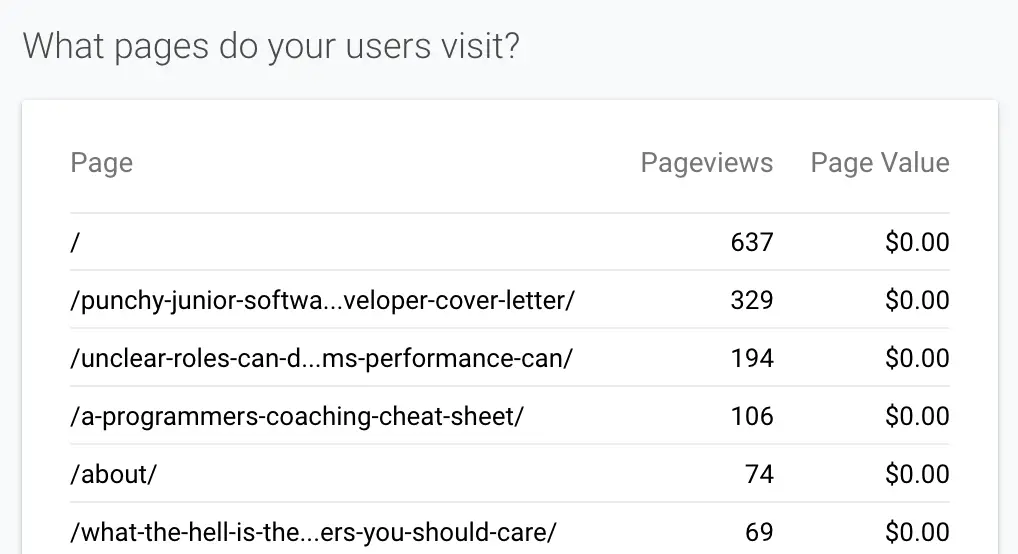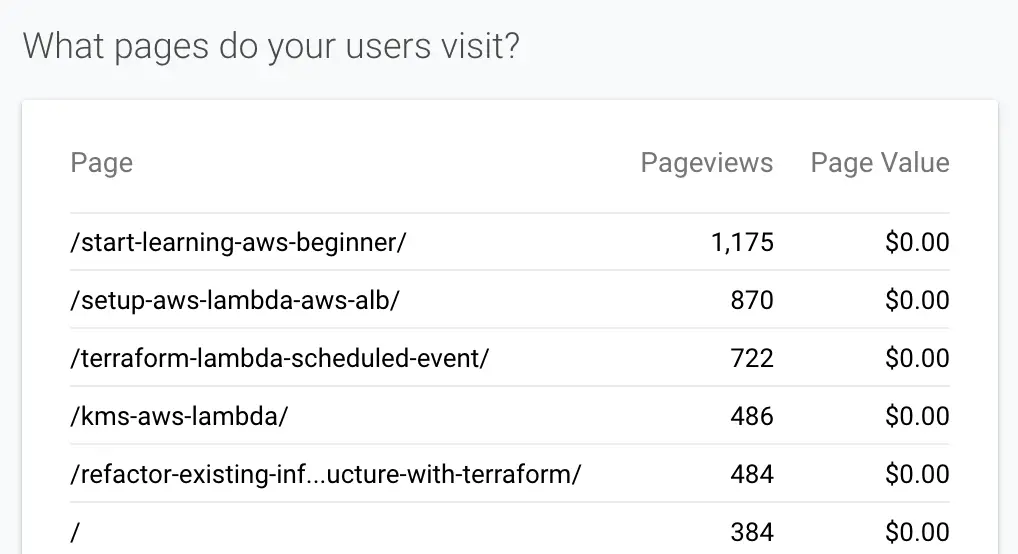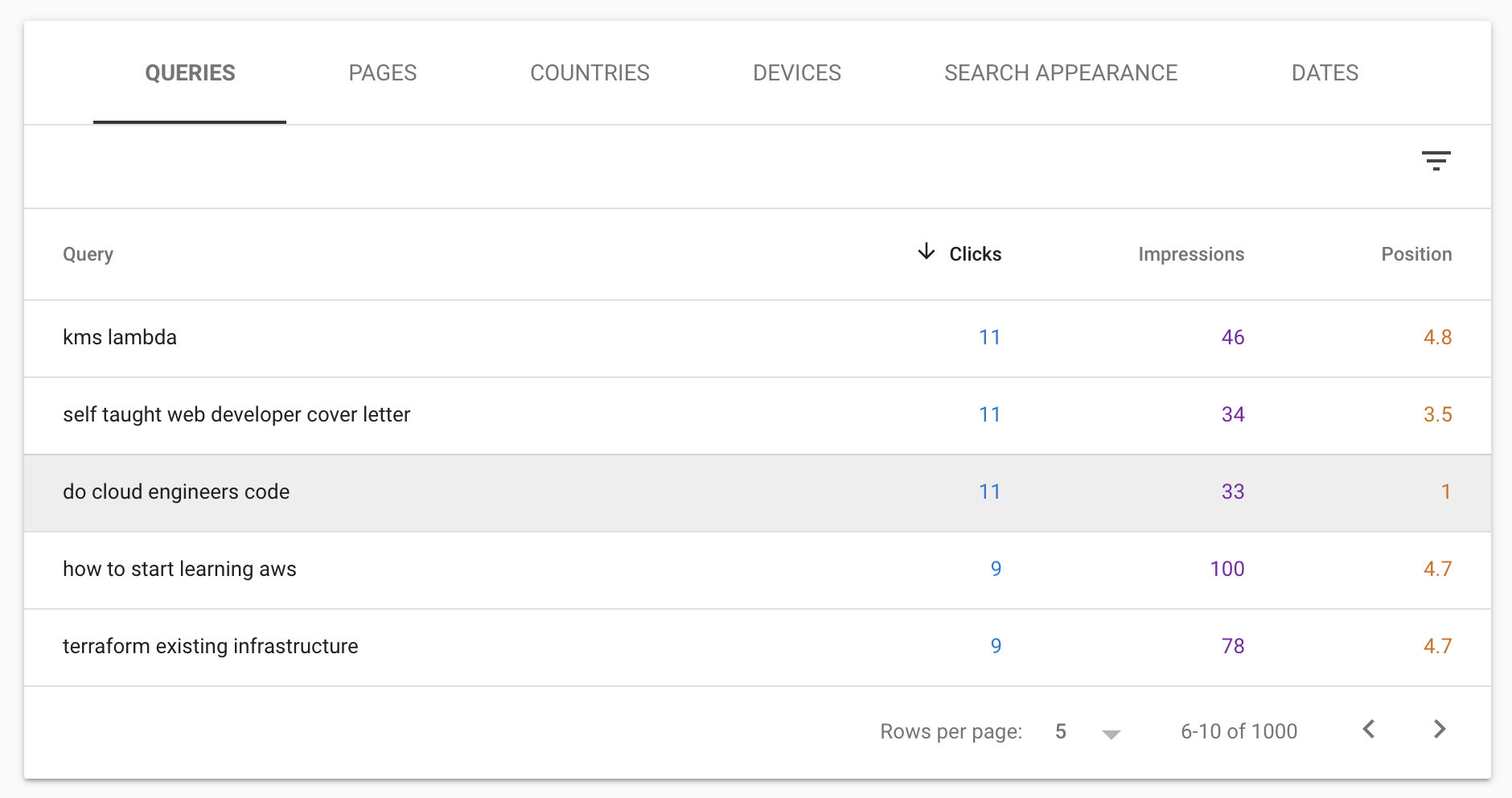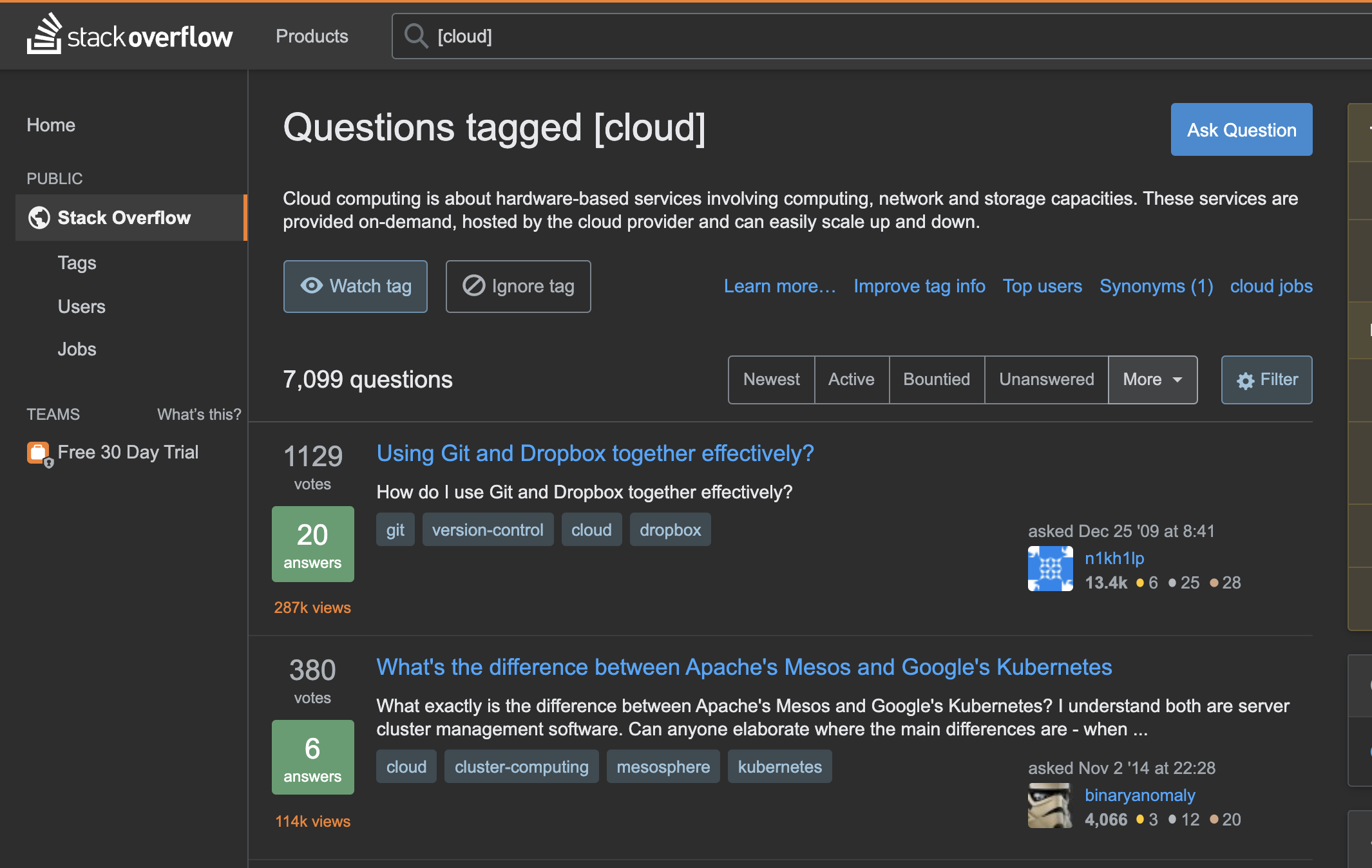How I Gained Consistent Traffic To My Website Using SEO (And How You Can, Too)

Are you growing a website of your own? Are you looking to generate traffic to view your work? I want to take a slight step away from the usual proceedings of cloud content to talk about a somewhat different topic, website growth.
Some of you reading will have your own websites or blogs—and like me—you want to reach the widest audience possible. Today I’m going to give you a behind the scenes look at exactly what I did over the last year to gain consistent, repeatable traffic growth to my own website through SEO. **By the end of this article you’ll know the two big changes that increased my traffic by 6X in less than 9 months. You’ll also understand three techniques I use to find winning article topics. **Edit: Since writing this article, my traffic is now up 17x, up from the 6x when I wrote the article a couple of months ago.
Let’s start at the inception of this very website (thedevcoach. co. uk). I started the website in 2017, around three years ago.
When I started out writing I didn’t really know what I was doing, nor where I was going. I wrote about whatever popped into my head. To give you an idea of the type of content I was putting out, here’s a handful of titles from 2018…
-
“Want to become more Agile, ask yourself these three questions”
-
“On being and hiring an apprentice”
-
“Important questions I ask myself every week, and why”
Without even discussing the quality of the articles, my topic selection was (to say the least) pretty random. Random topic selection isn’t uncommon for these blogs like mine, I see this pattern all the time.
As I found out later, for gaining any serious traffic, or traffic at all, I was making some big mistakes (we’ll cover what those things are soon). But first, let me dust off some charts from Google Analytics and you’ll see what I mean…

Website Stats 2017-2019
You can see how throughout two years of consistent writing—around 75 articles throughout this period—the amount of traffic the website received stayed entirely steady. 500 users a month (ignore the blip at the end, it’s not worth discussing, things soon returned to their painfully low levels).
I was publishing articles consistently yet my traffic didn’t budge. Initially I wasn’t too concerned, but sure enough, after time I did start to wonder… “are my results normal?”. The numbers seemed low.
Let’s jump ahead and see how the same chart looks now…

Website Stats 2019-2020
Whilst the charts may look similar at first glance, it’s important to notice the Y axis. Since early 2019 I achieved growth of around 6X. For someone who spent 2 years fumbling in the dark making no progress, this was big! Really big!
I went from having essentially no traffic… around several hundred users a month, to nearly 3000 (UPDATE on October 2020: 12,000) users. These are still only modest numbers, but I was finally starting to do something right. And I was doing it consistently.
This traffic was coming straight from Google. And it continues to arrive every day without any intervention. No long nights posting on social media, no paid click farms, and no crafting offensive Tweets just for the clicks.
But—unlike before—the results change didn’t surprise me. Why? Because I had made some deliberate changes, both to my websites topic focus, and also how I selected topics. Changes in these two areas made a BIG difference.
When I show you the detail of those two changes you’ll see why…
The “Secret” To My Traffic Trajectory
Through this period of growth there were many factors at play. For instance, my writing definitely improved, and I continue to be consistent. But quality and consistency weren’t the things that made the biggest difference.
The two changes that made the big difference were: choosing a more focussed topic, avoiding the temptation to write about random topics, and learning how to choose winning topics that pulled in traffic from Google.
These are fairly big topic areas, so let’s break them down…
1. Finding A Website Focus
Firstly, I recognised that my writing was becoming fairly random. If you landed on my website I’d have forgiven you for thinking: “What is this all about?” and I’d also have forgiven you for not coming back.
So I had a look through my past topics, and tried to find the common thread. What was it that I was really writing about? Under what common theme could I link all my previous work so that it made more sense?
I’d grown despondent at pouring in time and energy to the website to see barely any results. So despite my hesitation, and feelings of discomfort in restricting my writing, I decided to stick on one topic: Cloud Engineering.

Cloud Engineering Website Header
I set about making the changes to the website to reflect my new focus area. I updated the header to: “Learn Cloud Native Software Engineering”. I updated the about page. I updated the sidebar. I updated the Newsletter to the “Cloud Native Software Engineering Newsletter”.
I created a “cornerstone” article for each of the big topics in Cloud Engineering: Infrastructure As Code and Serverless. I’m currently working on Containers, and AWS. And in the future I’ll cover testing, monitoring and more.
Everything was Cloud.
Now the website had a better focus, it became instantly more attractive to readers. The website made a lot more sense, it was just more logical. But, I still had another lingering issue… I needed to fix the content. I didn’t have much cloud-specific content, and that needed fixing.
I was also determined not to write more random content. I wanted to write content that mattered to my readers. So I began my search to understand how to choose better articles too…
2. Choosing Better Articles
You can build a website in many ways. You can be beautiful, you can be interesting, or you can be useful. Despite being (clearly) both beautiful and interesting, the logical way for me to grow my traffic was by being useful.
If I wanted to be useful to my reader, I’d need to stop writing random content, and start solving real life actual problems for my readers. Putting my reader and their problems first, and my writing interests second.
Being useful is easier said than done, how do you know what problems readers have? And how exactly do you find out what they need? (spoiler: I explain exactly how to do exactly this later).
But before we get into the details of how to find good topics, let me show you what the impact choosing good topics had for me. Let’s again pull up Google Analytics and look at the data…

Top Pages 2019
Before making changes to my topic selection, almost 50% of my traffic came from a single article that I wrote about Junior Developer cover letters. The traffic was coming because Google found my article and it ranked pretty well.
I remember thinking to myself: “If only I could repeat that article I’d have more success”. But despite my best effort I couldn’t recreate the success of that post. The problem was: the post was successful merely because of luck. I had no systematic approach to recreating that success. Until now.
Again let’s jump ahead and see how the same chart looks now…

Top Pages 2020
The original article is now nowhere to be seen! Well, it is still there, just it’s buried under a whole raft of even more successful articles that pull in even more traffic from Google. Sweet!
But you’re probably reading this thinking: “Okay, that’s great for you, but you probably got lucky”. But the thing is… I didn’t. There are ways to systematically pick topics that solve real problems and pull in real traffic.
Let’s now leave behind my story and turn our attention to you, and let’s dig into how you can find topics that matter to your readers so that you can pull in traffic from Google consistently for your website too.
Finding Good Topics For SEO
We don’t have time to cover SEO in depth in this one article right now. But you need to know a little before we move on, so let me give you the quickest summary possible…
Google ranks articles which **A. ** Readers actually search for. And **B. ** Articles which signal back to Google that they’re “successful”, i. e the user went to the website and found what they wanted, and they didn’t go back to Google frustrated and continuing their search.
What this means for you is: If you know what a reader is searching, and you answer their question in a thorough, yet precise way, you’ll get traffic from Google. It really is that simple.
The only real catch is: If someone has already answered the question, it’s going to be harder to rank, and harder to get traffic. So you’ll want to find topics that aren’t already answered thoroughly by some big players in your topic area.
That’s the playbook.
But of course, the devil is in the details. How do we find that, seemingly perfect, intersection between a topic? Where people are actually searching for a topic and the topic is relatively unanswered? The answer: Go to Google.
There are in fact many, many different ways you to find topics on Google, but I want to show you three practical ways that I use personally for finding topic ideas on Google…
1. Google Search Suggestions
The simplest way to find topics is to start searching for topics related to your area of interest. In my case that’s Cloud Engineering. Let me show you a great example of where this worked perfectly…
A large topic for me when it comes to cloud is AWS. One day when I was poking around in Google for topics related to AWS, I noticed that in the search results there was a forum response high up in the rankings when I searched “where to start learning AWS?”.

Where To Learn AWS Forum
Note that whenever you see forum responses high up in Google search results you know you’re sniffing in the right direction. Questions asked on forums signal that people are searching for the topic.
But, as is the nature of forums, the answers can be difficult to dig out. In forums, answers are usually scattered with (sometimes conflicting) advice within the the comments of multiple respondents.
So I set about writing my own article…

Learn AWS Beginner
And here you can see my article is now ranking at number one for that search, above even AWS themselves! This is crazy. Also just notice the amount of adverts. That shows you that the topic is highly sought after since companies are clearly shelling out to rank where I rank (except I did it for £0).
What you’ll notice here as well is that the article has almost the same title as the forum. I intentionally answered that persons question directly and I wanted to use their very own language when I did it. It’s the language my readers use, so it’s the language that most makes sense for them.
And that’s one great way to find topics: Simply search through Google like your reader would. Pay attention to where their needs aren’t being met by the results on the search results page, and start to question: Why aren’t their needs met? Could I write an article which better answers their question?
2. Reusing Inbound Topics From Existing Articles
Another technique I’ve used for traffic is to simply pay attention to the inbound topics that are already arriving on your site. Disclaimer: This method works mostly when your website has been up for a little while, and is already getting Google rankings. But nevertheless, let me explain how the method works, because it’s useful.
Let’s take an example…
Say you wrote an article titled “What Is A Cloud Native Software Engineer” and that article started to get picked up by Google. After a while you might see (in Google Search Console) other topics which brought readers to your article, for instance you might see searches for the topic: “Do Cloud Engineers Code?”.

Google Search Console
And if the image didn’t provide a strong enough clue, you might have guessed that this exact situation happened to me. I did in fact notice traffic to my website on the topic “Do Cloud Engineers Code?“.
I went to Google to see the results page. As I expected, the results page was bleak. There were no substantial answers to the question. I knew I could do a decent job to answer this question. So again, I set about writing the article.

And sure enough, after only a short while it was ranking number one, with a rich snippet (where Google takes an excerpt of your post and wraps it in a box). Not just that, but the article is now also my second highest traffic article of this year. This technique works.

Page Views 2020
3. Using Forums To Mine Topic Ideas
The last area I want to talk about with you is forums. Forums are an absolute treasure trove for topics. Within Software, StackOverflow is king, and StackOverflow has a great way for you to find topics.
The method goes like this… Head over to StackOverflow, and pick your favourite tag, i. e “Cloud“. You’ll see a set of results which you can then rank by popularity. This gives you a great list of potential topics.
Now all you need to do is grab the questions you’re interested in and put them into google. If the responses in Google don’t include many detailed, relevant articles that answer the question you could be on to a winner.

StackOverflow For Cloud Tag
I’ve used this technique many times when I’m short of ideas for articles. Forums like StackOverflow are an amazing way of tapping into your reader, and understanding their problems and needs.
And on that note, I think it’s time to wrap this up…
Go Get Your Own SEO Traffic!
Hopefully you can see that the secret to gaining traffic is quite simple: Find out what your readers want from you, and answer their questions. And just in case you were wondering… technical things like good website design and fast load times do matter for google rankings… but not nearly as much as having high quality, relevant content for your readers. So focus on that.
Now you should have ideas and a strategy to approach your own SEO traffic. If there’s any secret at all, it’s practice. You have to write a lot of content, and watch the results. Soon enough you’ll start to see where you’re getting success.
It can be very rewarding to spend time honing your own knowledge and to have the ability to share that knowledge with others. If you already have a website, why not give these techniques a go, and if you don’t already have a website… maybe you’re thinking about it now!
Just don’t get discouraged, stick at it, you’ll get there. I did.
Speak soon Cloud Native friends!

Lou Bichard
Hey I'm Lou! I'm a Cloud Software Engineer. I created Open Up The Cloud to help people grow their careers in cloud. Find me on Twitter or LinkedIn.
See all posts →Latest posts by Lou Bichard (see all)
- 2024 Summary - A year of trips and professional work - January 9, 2025
- 2023 Summary - Data Driven Stories About The Cloud - December 31, 2023
- 2022 Summary - The Open Up The Cloud System - January 1, 2023